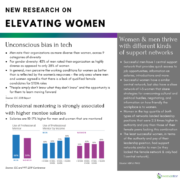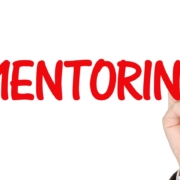First Class Experience: Hazelden Betty Ford Foundation Mentoring Initiative
/in Mentee Training, Mentor Training, Mentoring/by Julie KantorWant an 88% Boost in Productivity? Say YES to Mentoring Your Managers
/in Business Case for Mentoring, Mentor Training, Uncategorized/by Julie KantorMars & Venus? Big New Studies on Women in Tech from IDC and Northwestern
/in Business Case for Mentoring, Inclusive Mentoring, Mentor Training, Mentoring/by Julie KantorTwomentor Partners With WITI For Mentoring Programs
/in Employee Retention, Mentee Training, Mentor Training, Millennials/by Julie KantorTwomentor has partnered with WITI (Women in Technology International) in order to begin offering creative and long-lasting mentoring programs to WITI’s corporate membership. The partnership is built to empower the corporate partners with many mentoring options that will improve recruitment, employee engagement and retention across the globe. Twomentor’s CEO, Julie Kantor will preform the duties of Master of Ceremonies at the 25th Women in Technology Summit from June 9-11, 2019, hosted by WITI.
“Over the past 30 years WITI has been the go-to-organization for women in technology looking to advance their career and grow their community,” said Carolyn Leighton, CEO and founder, WITI. “This new collaboration will allow our corporate partners to take advantage of Twomentor’s unique mentoring programs and help drive employee retention and inclusivity.”
An Association of Talent development report has shown that 75 percent of executives believe that mentoring was a key to their success. A separate Deloitte study revealed that over 75 percent of millennials believe that having a mentor is vital to their career growth.
A report from Wharton-Gartner discovered that mentors were promoted six times more often than non-mentors, while mentees were promoted five times more than their non-mentee peers. The retention rate for both groups was as 20 percent higher. Mentoring has been proven to help develop and keep new employees and it allows current employees to excel, which saves companies as much as 300 percent the cost of constantly refilling these open positions.
With Twomentor’s unique Mentor Roadtrip Flash Mentoring, companies receive a hands-on session facilitated by our professional staff that will take the participants on a journey of mentoring. The workshop is a dynamic 60-90 minute experience that will boost your conference and create a culture of clarity around the business case and create a value proposition of mentorship, showing it to be a driver of engagement and retention for employers. Twomentor also will offer the same service to employee resource groups and associations that desire to launch their own strategic mentoring and recruitment initiatives.
“Our goal is to help create a multi-generational and gender inclusive workforce where businesses benefit from more engaged employees,” said Julie Kantor, CEO and founder, Twomentor. “By partnering with WITI, we can help companies build sustainable mentoring initiatives and further elevate women and diversity in corporate America.”
Kantor will be the emcee at the Women in Technology Summit and will also deliver the Mentor Roadtrip Flash Mentoring experience on June 11th at 8:30 PDT in order to engage the conference’s attendees and help them t support each other in the professional arena.
To learn more about Mentoring initiatives, visit www.twomentor.com today.
Are You a Mentoring Manager? 70-20-10
/in Development, Employee Retention, Mentee Training, Mentor Training, Mentoring, Millennials/by Julie Kantor
If you are in the training and development field you have probably heard of 70-20-10. My friend Raul C. recently enlightened me on this topic (thank you Raul!).
Based on three decades of research by the Center for Creative Leadership, managers learn 90% by doing, experiencing, communicating and learning from others. To break it down:
- 70% from challenging assignments
- 20% from developmental relationships (learning from others)
- 10% from coursework and training
“Development generally begins with a realization of current or future need and the motivation to do something about it. This might come from feedback, a mistake, watching other people’s reactions, failing or not being up to a task – in other words, from experience. The odds are that development will be about 70% from on-the-job experiences – working on tasks and problems; about 20% from feedback and working around good and bad examples of the need; and 10% from courses and reading,” states researchers Lombardo and Eichinger expressed their rationale behind the 70:20:10 model this way in The Career Architect Development Planner.
When managers learn-by-doing (John Dewey) and receive mentoring/help from others, they are in a better position to take that learning enlightenment and return to teach others… (aka the Joseph Campbell hero path below).

According to a Deloitte survey over 79% of Millennials want their managers to be mentors and coaches in their management style.
We need to look at the role mentoring plays in this 70-20-10 model. Especially in a time where more and more people are reporting that they do not have a professional mentor they go to for professional life. In fact, over 50% report to NOT having a mentor at 40+ professional conferences where we ran surveys and polled the audience)
A good mentor:
Shares from his/her experience
Listens
Gives feedback
Tries to help another come to his/her own conclusions
Creates a safe space for communication (and confidentiality)
A mentor might take their mentee to do something experiential together
Cares about their mentees aspirations, goals and successes
A mentor is a lifelong learner and will learn from teaching and invest in his/her mentee
Finds strength and meaning in seeing another human being self-actualize (Mazlov’s hierarchy of needs- plus!)
I was speaking with some leaders from Gannett Corporation and they shared with me that in a 2015 survey, 100% of their senior leaders felt that they got to where they are today thanks to a mentor.
Can you think of your own 70-20-10 learning and what role mentors have played (or not played) in your career? Perhaps you didn’t use the word mentor before, but if that person’s help led you well onto your path, let’s stop now and reflect on that… and them.
Love to hear from you and learn from your experiences! Contact us info@twomentor.com
# # #
Julie Silard Kantor helps leaders build their living legacies through mentorship and sponsorship. She and her team at Twomentor, LLC are helping to build a much-needed mentoring revolution through thought living-legacy leadership work, mentor training, mentor culture building, Mentor Road Trip™ flash mentoring web sessions and more in many sectors. Two adages that drive us are:
1] The people who mentor at your company are the people who drive retention at your company
2] If you want more diversity (i.e. women in STEM), mentor and sponsor more diversely
Going Through Big Corporate Changes? Time to Start Mentoring Initiative at Your Company
/in Employee Retention, Mentee Training, Mentor Training, Mentoring, Millennials, Uncategorized/by Julie KantorWhat happens when the leaders leave (or are replaced)? When the revenues are not resembling hockey stick performance? When a big company gobbles up a smaller company? When there is an 8% layoff of the workforce? People start feeling like their jobs might be on the line. They feel a new leader might not understand their contributions. They might feel someone is trying to steal their lunch. Culture changes. Isolation increases along with Indeed.com searches. Linkedin resumes get brushed up. Mistrust or toxicity coupled with insomnia can seep in.
I’ve heard it many times in my five years of building mentoring initiatives. “Julie, with all the change, shouldn’t we wait until after things calm down to get started with our mentoring initiative?” a top HR executive asked me.
In running both mentor and mentee training, often the rising-star mentee is looking for someone who can help them navigate the new environment. Someone who will sit down with an iced coffee (or Ben & Jerry’s pint) for a chat, a safe haven to reflect on, ‘How do I best position myself in the midst of change?’ ‘How do I get off to the right start with my new boss?’ ‘How can I be part of the solution, when I am worried about how things are going financially?’
The mentor, often with more experience, might not have all the answers, but likely has experienced more change in their tenure and will have new perspectives to offer up.
The mentor serves as a role model. They care about their mentees goals and objectives and can be instrumental in talking someone ‘off a ledge’ who is nervous. Encourager and challenger, the mentor often will help the mentee understand their role in better ‘owning’ their career trajectory and not being the victim in a who-moved-my-cheese environment that we are seeing more and more. Change = Today’s Reality.
I was watching Good Morning America a month ago and the words ‘America’s Loneliness Epidemic’ crawled across the bottom of the screen. Curious, I Googled the UCLA research and it was eye-opening. Almost 1:2 Americans (20,000 in the study) stated that they sometimes or always feel alone, lonely or left out. Particularly hard hit are our youngest generations. How does that manifest in a workplace which is often a key pillar in our lives and psychological/financial stability? Read more HERE on the study’s findings.
In building a pilot-to-sustainable and scalable mentoring initiative, we create an opportunity for our workforce to not isolate. A world where people are recognized for helping-each-other. We engineer and hold the space for people to connect with morale-boosting support from the top. Employees have the learning conversations with structure in place.
When I ask hundreds of mentors in trainings what do people most come to them for advice on, the response is usually:
1] To help them advance their career,
2] To learn how to network better,
3] To be better at people management, leadership and
4] To help them prioritize
With the fast-paced corporate growth and more predictable flux ahead, do you want to wait for another season or reason to show your people you are a stand for them as they take a stand for each other?
—
Julie Kantor is CEO of Twomentor, LLC a high impact company that provides mentor strategy, training and execution for large companies and organizations. She can be reached at julie@twomentor.com
10 Professional Discussions Millennials Should Have With Their Mentors
/in Mentee Training, Mentor Training, Mentoring, Millennials/by Julie KantorCo-written with A. Crosser
What is the culture of your organization?
What’s more important to you corporate values, mission or vision?
If you could start your company all over again, what would you have done differently?
Were three of the thoughtfully selected questions asked by a bright young woman named Tong from The Washington Center internship program today as she ponders her career path.
The Millennial generation (born 1980 – 2000) is coming of age, and many of today’s young adults are finding themselves in their first real positions as professionals or on the cusp of starting families. As they graduate college and find jobs in their field, many younger Millennials are looking to their mentors to help guide them through this turning point in their professional lives and help them navigate the somewhat turbulent seas of the workplace.
Millennials face many struggles which are unique to their generation. They have different ambitions, and treat their professional lives differently than those who came before them. They also have Glassdoor.com, Linkedin and many tools that we didn’t have on our quest to rise through the ranks.
PURPOSE OVER PAYCHECK: According to a Deloitte study, 64 percent of Millennials say their personal values have the greatest impact on their decision-making process, and 56 percent of Millennials globally have decided against ever working for a company based on their values and standard of conduct. A second Deloitte study shows that a whopping 87 percent of Millennials believe a company’s success should be determined by more than their financial performance – namely, they believe employee satisfaction should be taken into consideration. This is a major shift in perspective, as many older professionals haven’t placed as much of a premium on where they work or at times the ethics of their company – many only see their job as a way to put food on the table for their family.
What do these statistics mean for newer members of our workforce? Simply put, they indicate lack of guidance in for today’s upcoming professionals, as they live (and drive) a new reality which older generations might not relate to in the same way. They may look at their father who worked in an unethical factory for 20 years of his life, and find no support when they say they don’t want to work there out from a moral standpoint. They might feel some skepticism toward the Baby Boomer professor who has publicly apologized in classrooms for their generation leaving the future with trillions in debt. Millennial women globally face a particularly difficult personal battle, as their mothers and other women in their family may encourage them to marry and have a family instead of pursuing a career. In 1970, only 11 percent of women with college degrees were employed by the labor force — a number which has risen to over 30 percent (in the United States) Women (with and without college degrees today make up almost 50% of the overall workforce in the US.
These statistics indicate a particular need for Millennials — the need for guidance and mentorship. We’re taking a look at the first 10 or 20 professional discussions millennials should have with their mentors in order to get the most out of their mentoring ‘sessions’. By having the discussions listed below, the next generation of young professionals can set themselves on course for great success in their fields. The answers to the questions below will help guide them in the right direction, helping them achieve their professional goals and make a difference in the world. Additionally, we encourage mentors to come up with sets of questions as well. We can all learn from each other and clear the cobwebs that often block us from seeing.
- “What do you wish you knew at my stage?”
As we grow and develop new knowledge, we begin to find answers to questions we had during our youth. Had we known these answers earlier in our careers, we may have made smarter or more informed decisions than those we ended up making. One of the best ways to share our accumulated knowledge is with young professionals entering our field, as we can guide them as we wish someone had guided us. If you’re a professional Millennial looking for guidance, ask your mentor what they wish they knew at your age or what they wished a mentor had told them – chances are, you’ll find very useful information that could change the course of your career.
- “What were your failures, and how did you learn from them?”
In the same boat as the discussion above, discussing past failure is an excellent way to learn what to avoid, and which paths to take. Part of making mistakes is learning lessons, and lessons should be passed on to others to help them avoid the same mistakes. As was said by Henry Ford ‘Failure is the chance to begin again more intelligently.’ and ‘Failure is neither fatal nor final.’ Here you could have a great conversation on resiliency.
- “What would you do differently, if you could start over?”
As successful as your mentor may be, there are probably some scenarios they would do differently if they could go back in time. Ask them about situations which they believe they could have handled more efficiently, or decisions they wish they had or hadn’t made. These answers can help you avoid setbacks to your success, and make wiser decisions in the long-run.
- “What do you struggle with?”
Everyone struggles with something, no matter who they are, their age or where they came from. After years of practice, your mentor still struggles with some aspect of their career. Take many professional women in the MENA (Middle East and North Africa) region, for example. While more than half of all University students in the Middle East and North African region are women, they make up only 21 percent of the workforce – largely due to societal demands. Many professional women struggle with raising a family and working in a career (particularly in STEM fields), despite how successful they may appear to others. These women could use their struggles to guide other young women enduring much of the same, to show them that societal demands can be overcome.
- “What would you do in my shoes?”
When you’re faced with difficult decisions, the best question you can ask is “what would you do if you were me?” It can be difficult to objectively analyze your situation and come up with the right “next move,” and asking someone who’s faced similar decisions what they would do in your shoes can help you understand what you might consider doing next. Another way to ask this question is “Have you been in a similar situation and how did you handle it?’ We have so much to learn from each other’s stories.
- “Describe your most rewarding accomplishment.”
Success has different meanings to different people. In our youth, success looks like fancy cars, Instagram worthy lifestyle and red carpets, but as we age it often takes on a new look. By asking mentors what they believe is their most rewarding accomplishment, you can get an idea of what they value as a result of their experience. You can get a picture of what your long-time goals might evolve into – in fact, your mentor’s answers will more than likely surprise, as they don’t often answer this question with the answers we think we’ll hear.
- “What am I doing wrong?”
Everyone wants to be right, but in reality we’re all wrong more often than we’d like to believe. Many times, fixing one or two small aspects of our perspectives, actions, and motives can mean a world of difference for our future. However, it’s challenging to evaluate ourselves as we have a natural tendency to believe we’re always right. Your mentor’s experience will allow them to objectively look at you and tell you what you can do better – for many, this invaluable advice can mean the difference between success and failure. Another way to rephrase this question is to explain a challenging situation and ask “What am I not seeing here about my role?” Reshma Saujani really pushes in her outstanding TED Talk that we encourage girls to be brave not perfect.
- “How can I become more productive at work?”
Even the most intelligent of people can fall victim to laziness or burnout. Some of the greatest ideas of all time may have been lost as the result of low-productivity, but even with this knowledge many of us struggle to discipline ourselves and make our dreams a reality. Your mentor has likely struggled with many of the same issues, so ask them to weigh in. It’s like being on a road trip and realizing you are out of gas or are dealing with a flat tire. Most professionals have their own set of productivity tips, so see what kind of advice your mentor has to offer to recharge your batteries. Also, please share with your old-timer (just kidding) some of the technology tools and more that make you more productive. We are big fans of reverse mentoring @Twomentor.
- “When you were my age, what were your goals? How have they changed?”
Over time, our goals change. We begin to prioritize certain aspects of our life over others, as we trade all night parties for families and fast food for gluten-free. What once seemed valuable and important can become meaningless overnight, but the striking change can cause fear and anxiety for many as it occurs. Many times, we’re afraid to let ourselves change for the better, as we fear that we may be leaving an important part of ourselves behind. By better understanding how your mentor’s goals have changed, you might become more comfortable as you face similar changes in your own life.
- “What traits do I need to succeed in this field?”
Every field has secrets to success – many of which you’ll never learn in a classroom. Medical professionals must be patient and empathetic, while engineers must have laser-sharp focus and an uncanny attention to detail. Artists and entrepreneurs must be both fearless and creative, while athletes must have perseverance. Your mentor can tell you exactly which traits create leaders in your field, and how you can develop them with ‘eye of the tiger’ conviction.
Next week we will share Part Two. 10 More Professional Discussions to Have with Your Mentor… Please follow this blog to alert you when it is posted.
Julie Silard Kantor is CEO of Twomentor, LLC a social impact company dedicated to helping companies retain Millennials and elevate women in STEM fields through mentor training and strategy. She will be chairing the Global Women in STEM Conference in Dubai October 25-26th through the Meera Kaul Foundation and recently presented a speech to 350 Millennials from 85 countries at the United Nations through World Merit360.
They Got Fired! Would Mentoring Have Saved Them?
/in Employee Retention, Mentor Training, Mentoring/by Julie KantorWritten by Julie Kantor and Delia Borbone
Today our team sat in the ‘war room’ of Twomentor’s global headquarters (that means, a single office in Bethesda with three summer associates, a consultant and a very fatigued White Havanese pup named Naomi). One of our team members brought to our attention a Inc. magazine article by Alison Green of an unusual and saddening summer internship circumstance. A group of interns did not understand the strict dress code of the company they were working for and decided to submit a proposal asking for minor modifications in the dress code. The company responded by holding a meeting, where all the interns who signed the proposal were terminated.
We scoured through the comments and there were interesting debates on corporate culture, etiquette, and who was the party to blame. But we realized that bottom line, our Millennial and Generation Z workforce are coming to us to learn and be mentored so we want to equip you with 8 recommendations on being an effective mentor:
1] Listen- To be a successful mentor, you must be an attentive listener. This shows that you are genuinely interested in what is going on in your mentee’s life. Listen closely to gain a better understanding of where he/she is coming from, and to help you advise them appropriately. Find out what your mentee knows and what her/his blindspots might be as a newcomer in the working world.
2] Balanced- A mentee comes to you to share news, to ask for advice and opinions, and sometimes to let out their frustrations. Your job is not to agree with everything your mentee says, but to help him/her think rationally about situations and approach them from a level headed perspective. Perhaps an internal mentor would have advised the interns not to develop a signed petition with a greater enlightenment of the corporate culture (we write as we stand here in flip flops and jeans- just kidding!)
3] Trust- Your mentee is going to come to you with all sorts of things, some of which may be personal or things they don’t want shared with others. He/she is telling you this because they trust you and value your advice. This is a great honor. It is imperative to keep conversations confidential and not break your mentee’s trust, unless it is a violation of HR policies or could cause real harm to the individual/company.
4] Be Open and Try Not to Judge- Mentoring requires a willingness to share about your own experiences that relate to your mentee’s queries, and be able to give thoughtful advice. Better yet, if you can lead your mentee to finding his/her own conclusions through your stories. The more open and authentic you are, the more open to sharing your mentee will be as well. You also must be open-minded. Unexpected conversations and situations are very likely, however you are here to help and advise, not judge.
5] Availability- Mentoring is a time commitment, and regular meetings are crucial in developing a good relationship. No matter how much you like your mentee, if you don’t have the time for them it is best to let them know and help them find a different mentor who can devote more time. We move into an era of skills-based mentoring as older generations are learning to pass the baton and embrace reverse mentoring in the workplace.
6] Model- You are being watched. “Just while observing you, mentees pick up many things: ethics, values and standards; style, beliefs and attitudes; methods and procedures. They are likely to follow your lead, adapt your approach to their own style, and build confidence through their affiliation with you. As a mentor, you need to be keenly aware of your own behavior.” (E. Wayne Hart, Forbes.com)
7] Honesty- “If you’re brave enough to ask your mentor for advice, he or she needs to be brave enough to give you a straight answer. If you’re contemplating taking a new job, for instance, and you explain the situation and ask for your mentor’s point of view – he or she should give it to you, unvarnished.” (Erika Andersen, Forbes.com)
8] Goal Oriented- “A good mentor continually sets a good example by showing how his/her personal habits are reflected by personal and professional goals and overall personal success.” (Franchise Growth Partners)
Both the interns and the managers of the company might have approached this situation differently, and ideally with a mentoring lens. Anyone who brings on an intern is onboarding our future workforce and taking the extra steps is often the difference between success and failure (see articles ‘Ready to Go the Extra Mile for Your Interns and ‘Interning With Your Best Foot Forward’). Despite the unfortunate outcome for the interns and company, we know this is a learning opportunity for all involved and all readers. We sincerely hope that they will land well next summer if not sooner with a new viable opportunity.
Twomentor, LLC, is a management consulting firm that provides mentor training, strategy, flash mentoring sessions and global speaking to elevate women and better retain Millennials in the workforce. We believe in mentoring cultures.
When Your Mentor Isn’t Perfect: 5 Strategies For Bringing Out The Best In Each Other
/in Development, Mentee Training, Mentor Training, Mentoring/by Julie Kantorby Devi Jagadesan, Summer Associate at Twomentor
Nobody’s perfect, including our mentors that we look up to. Some of us are unorganized, lack communication, or simply get caught in the chaos of a difficult work schedule that we forget we have someone looking up to us as a role model. However, there is always room to improve as a mentor while bringing out the best in your mentee. According to Deloitte, Millennials planning to stay with their employer for more than five years are twice as likely to have a mentor (68%) than not (32%). Furthermore, according to a 2014 survey by The UPS Store, 70 percent of small businesses that receive mentoring survive more than five years – double the survival rate of non-mentored businesses. There is such a strong business case for mentoring, but these relationships can get derailed if not nurtured or if we have unrealistic expectations of each other.
1. Honesty and open communication
It is important in a mentor/mentee relationship to build the foundation early for how you both will give and receive feedback. Being transparent builds trust and more room for open communication. Make sure as a mentor, you listen closely to your mentee and get to know them both as a person and a professional. You are in a position to help your mentee build on her/his strengths while giving constructive feedback on areas your mentee can improve. I had a concerned mentor ask me often “Are you taking care of yourself,” as part of his dedication to self-care being vital in the workforce. His feedback was well received. If you go overboard with critical feedback, the relationship will most likely deteriorate. Good communication is key for a long-lasting mentor/mentee relationship.
2. Goal setting and task oriented
Part of being a mentor is helping your mentee on the journey toward achieving his/her goals. A lot of mentor-mentee relationships fail because there are no clarified objectives as the basis of the working relationship. It is important to go over the mentee’s goals on the first or second meeting and recognize milestones monthly or bi-monthly. New goals may emerge. Some mentors try to form their mentee into their own image, by having your mentee establish their own goals. Your job is to support your mentees vision and success while encourage them to keep the momentum moving forward.
3. Mutual respect
Your mentor or mentee might disappoint you personally or professionally. This can be very hard emotionally on the mentor/mentee relationship. Mentors and mentees must have mutual respect for one another but might have different values, and beliefs. Although a mentor usually has more experience than the mentee, being able to respect his/her mentee for their strengths and all they have to bring to the table is vital. When a mentor believes in the mentee, it gives them the courage and confidence. Likewise, when the mentee has respect for their mentor for their experience, skills, ability to guide, the mentor is more willing to help. The mentor has an abundance of knowledge to offer the mentee. Each individual will grow together. If you feel on either side that the person is unethical, we suggest you move on and not align yourself with them further.
4. Carve out time for each other
Along with having mutual respect, a mentor and mentee must allocate enough time for each other. Canceling and rescheduling too many meetings can really weaken the potential of the relationship. This goes back to the point of mutual respect and valuing the other person’s time. Although we aren’t perfect, and sometimes get lost in a sea of scheduling conflicts, the relationship between a mentor and mentee is an important priority. Carving out enough time for each other must be in the upfront plan, even if it is just for 3 – 9 months of meetings.
5. Ask each other LOTS of questions
One of the best parts about the mentor and mentee relationship is that there for room for growth for both parties and trust needs to be established early. Getting to know each other is important whether it is about one another’s work, family life, or favorite hobbies and dreams. Finding commonalities make the relationship stronger and more enjoyable for both of you. You do not want to be strangers with your mentee, you want to build a rapport that makes you excited to be on this journey together. The more comfortable you both are, the more questions you can ask each other for learning and growth. Sharing your life experiences openly is also important for your mentee to hear so they can learn from your successes and mistakes. Your honest insights will make your mentee feel safe in opening up as well.
Lastly, The mentor/mentee relationship is a learning experience. If you follow these five recommendations, it will only strengthen the bond. A bond is formed when two people are able to be their true, authentic selves around one another. So the best advice is BE YOU, flaws and all because that is how both parties will benefit and grow.
LET’S TALK!
Scheduling Contact, Sophia@twomentor.com








